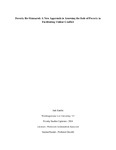Poverty Re-Measured: A New Approach to Assessing the Role of Poverty in Facilitating Violent Conflict

View/
Author
Kaelin, John M.
Subject
Washington and Lee University, Shepherd Poverty Program
Poverty -- Measurement
Violent crimes
Terrorism
Capabilities approach (Social sciences)
Metadata
Show full item recordDescription
Capstone; [FULL-TEXT FREELY AVAILABLE ONLINE] John M. (Jack) Kaelin is a member of the Class of 2019 of Washington and Lee University. The case of Rwanda raises several questions which I hope to shed light on through this research. My prevailing concern is studying the question of how the absence of human capabilities, poverty, can influence individuals to commit violent acts of terror. In examining this question, I hope to shed some light on contemplating, among other questions – does poverty make a society more susceptible to violence? How are the commonly attributed roots of terror related to human capability? And, by understanding these relationships, how can creating capabilities targeted at preventing violence allow for more peaceful societies? To answer these questions, I hope to first redefine poverty in the context of human capability. I noticed during my time in Rwanda that the role of poverty on influencing perpetrators widely referred to poverty in the context of material deprivation, rather than deficiencies in human capability. I saw this trend as problematic because it seemed to vastly oversimplify the impact of poverty, and saw it as a completely separate influence from other motives such as ethnic prejudice, coercion, and wartime insecurity. I want to shed light on how the very fact of these other motives reflects the absence of some human capability inherently related to poverty. [From the Background section] Kaelin, Jack